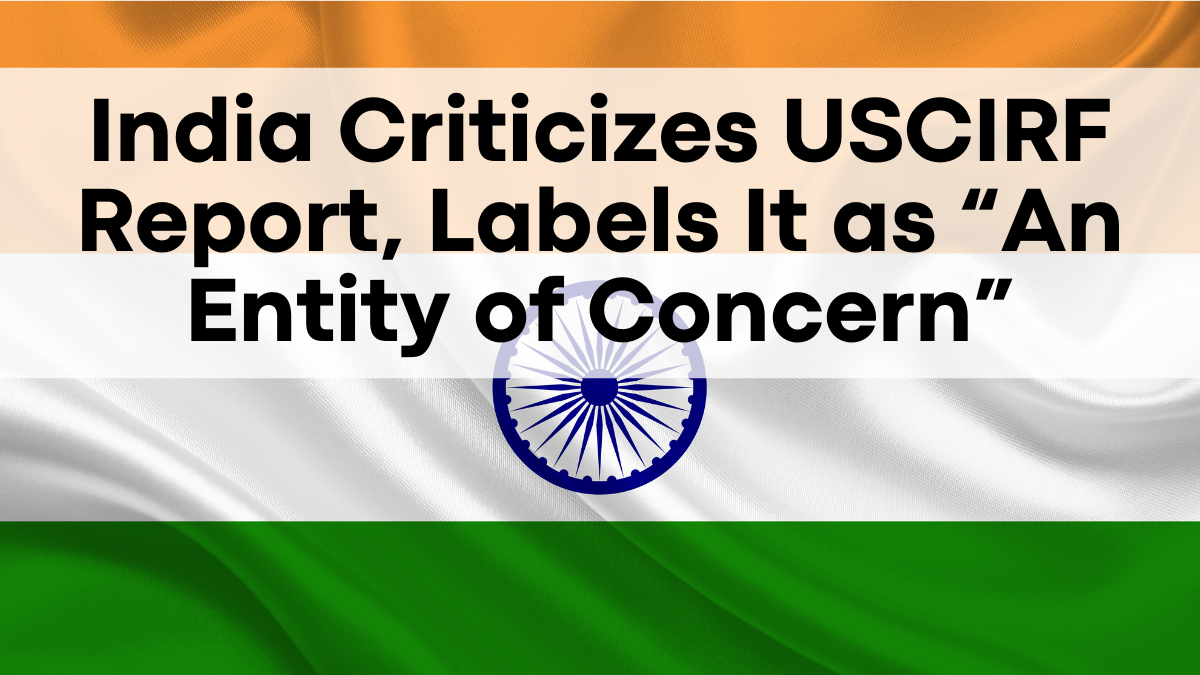India has issued a firm rebuttal to the 2025 report by the US Commission on International Religious Freedom (USCIRF), denouncing it as biased, politically motivated, and lacking credibility. The Ministry of External Affairs (MEA) described the USCIRF’s commentary on India as a deliberate misrepresentation of its religious and cultural reality, and even suggested that USCIRF itself should be labeled as an “entity of concern.”
The USCIRF report alleged rising persecution of religious minorities in India and made controversial recommendations, including sanctions against India’s external intelligence agency, R&AW. India has flatly rejected these claims, asserting its commitment to pluralism, constitutional freedoms, and secular democracy.

India Criticizes USCIRF Report
Key Details | Information |
|---|---|
Report Source | US Commission on International Religious Freedom (USCIRF) |
India’s Stance | Rejected report; called it biased and factually incorrect |
Ministry Response | MEA strongly condemned report and its motives |
Key Allegations | Religious persecution, biased governance, actions by R&AW |
India’s Rebuttal | Cited constitutional protections, multiculturalism, and legal safeguards |
Intelligence Allegations | Dismissed as baseless and lacking evidence |
Official Website | www.mea.gov.in |
India’s Response to USCIRF Report: Reaffirming Ground Realities
The Ministry of External Affairs responded to USCIRF’s 2025 annual report with a detailed rebuttal. The MEA emphasized that India’s diversity, democratic values, and commitment to religious freedom stand in direct contrast to the report’s claims.
Key Points in India’s Rebuttal:
USCIRF has repeatedly issued politically motivated reports targeting India
The report uses selective incidents and ignores India’s broader constitutional framework
India’s pluralistic society includes all major world religions living in harmony
The commission fails to recognize India’s democratic processes and institutional safeguards
India suggested that USCIRF itself should be labeled as an “entity of concern” for its repeated bias
The Indian government emphasized that its Constitution guarantees religious freedom, and any violations are dealt with firmly through the legal system.
Allegations Against R&AW: India Calls Charges Baseless
The 2025 USCIRF report went further than in previous years by recommending sanctions against India’s external intelligence agency, R&AW, alleging its involvement in plots against separatist figures abroad. India has strongly denied these accusations.
India’s Stand:
USCIRF has no jurisdiction or expertise to make claims about intelligence operations
The accusations are unsupported by credible evidence and politically driven
Attempts to target R&AW appear aimed at tarnishing India’s international standing
India reiterated its commitment to national security within the bounds of international law
These claims, according to India, reveal a clear lack of objectivity and an agenda-driven approach by the USCIRF.
India’s Multicultural Reality: A Direct Counter to USCIRF Claims
India used the opportunity to highlight its inclusive governance model and religious diversity, firmly rejecting the USCIRF’s characterization of religious discrimination.
Reality Check on India’s Religious Landscape
Aspect | Ground Reality in India |
|---|---|
Religious Freedom | Guaranteed by the Constitution (Article 25–28) |
Multicultural Coexistence | Home to Hindus, Muslims, Christians, Sikhs, Buddhists, Jains |
Legal Protections | Anti-discrimination and minority rights laws enforced |
Political Representation | Minority leaders in Parliament, judiciary, civil services |
Celebrations & Culture | National recognition of diverse festivals and cultural traditions |
India emphasized that minority rights are legally protected, and individuals of all faiths freely participate in public life, contradicting the USCIRF narrative.
Why the US Government Is Unlikely to Act on USCIRF Recommendations
Despite the strong language in the report, diplomatic experts believe the US government is unlikely to adopt the USCIRF’s suggestions against India.
Reasons for Inaction:
USCIRF is an advisory body, and its recommendations are not binding
India is a strategic ally of the US, especially in defense, trade, and Indo-Pacific security
Past USCIRF suggestions have consistently been ignored by the US State Department
The White House favors bilateral diplomacy over punitive actions
Sanctioning R&AW or designating India a “country of particular concern” would harm US–India relations
India’s strong global partnerships and strategic relevance make it unlikely that these recommendations will impact formal US policy.
India’s Firm Position: “USCIRF Has Lost Credibility”
India concluded its response by questioning the integrity and purpose of the USCIRF itself. The MEA accused the commission of misusing its platform to repeatedly malign India without basis.
Final Points from India:
India is a vibrant democracy with legal and institutional protections for all citizens
The USCIRF’s repeated bias calls its own objectivity into question
The global community should scrutinize the USCIRF for its selective approach and double standards
India’s model of pluralism and coexistence cannot be judged by politically influenced reports
India firmly asserted that it will continue to uphold the values of religious freedom, inclusivity, and constitutional integrity, regardless of external assessments that lack credibility.
FAQs
Q1: What is the USCIRF?
The US Commission on International Religious Freedom is a US federal advisory body that makes non-binding policy recommendations on religious freedom globally.
Q2: Why did India reject the USCIRF 2025 report?
India called the report biased, politically motivated, and disconnected from ground realities in India’s religious and social landscape.
Q3: What were the key allegations in the report?
The report accused India of persecuting religious minorities and targeting separatist groups through R&AW, which India denied.
Q4: Will the US act on the USCIRF’s recommendations?
Highly unlikely. USCIRF’s suggestions are non-binding, and US-India ties are based on broader strategic interests.
Q5: What does India say about religious freedom?
India maintains that its Constitution guarantees religious freedom, and all citizens enjoy equal rights and protections.
Click here to learn more